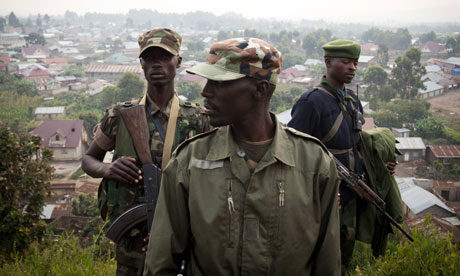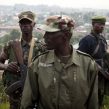
July 2013 Briefs
Publication: Militant Leadership Monitor Volume: 4 Issue: 7
By:

MILITARY OFFENSIVE LAUNCHED IN THE CONGO PRESSURES M23 LEADER SULTANI MAKENGA
Nicholas A. Heras
A new military operation launched by the Democratic Republic of the Congo (DRC) military is applying significant pressure on the Congolese, majority ethnic Tutsi militant organization Mouvement 23 du Mars (M23 – March 23 Movement) in the northeastern province of Nord-Kivu that borders Uganda and Rwanda (for the M23 see Terrorism Monitor, July 26, 2012; for the conflict in the DRC in Nord-Kivu see Terrorism Monitor, November 30, 2012). The operation has some support from the Force Intervention Brigade (FIB) belonging to the Mission de l’Organisation des Nations Unies pour la stabilisation en République démocratique du Congo (MONUSCO). The FIB is composed of roughly 3,000 South African, Malawian and Tanzanian soldiers empowered by a controversial UN Security Council resolution to engage in pre-emptive operations against M23 if it does not disarm (Reuters, July 17; al-Jazeera [Doha], July 16). Only 2,000 of the FIB troops have arrived in the DRC and the Malawians are not expected to arrive until the end of August. In the meantime the South Africans and Tanzanians are mounting local patrols. The fighting in Nord-Kivu resumed after a ceasefire that lasted approximately two months, which was believed to have been close to achieving the reintegration of low-level M23 fighters into the DRC military and M23 officers back under the authority of the DRC government (IGIHE [Bujumbura], March 7).
Emmanuel Sultani Makenga, a former colonel in the DRC military and the current leader of M23, was reported in the Congolese media to have been mortally wounded in the fighting, although this claim has yet to be verified (Direct.cd [Kinshasha], July 19). Allegations of Makenga’s impending death are not new. In June, he was reported to have been mortally wounded in fighting between M23 and an antagonistic rebel group in Nord-Kivu along with eight of his top officers, including his second-in-command, known as Colonel India Queen. He was reportedly taken to a hospital in Kampala, Uganda (L’Avenir [Kinshasha], June 20). Makenga also survived an assassination attempt launched by fighters from a rival faction of M23 led by General Bosco Ntaganda (AfroAmerica Network, February 23; for Ntaganda, see Militant Leadership Monitor, August 24, 2013). Ntaganda, (a.k.a. “The Terminator”) was once Makenga’s main rival for control over M23. After failing to wrest control of M23 from his rival due to Rwandan military support for Makenga, Ntaganda submitted himself to the U.S. Embassy in Kigali, Rwanda in March, after which he was transferred by U.S. authorities to the International Criminal Court (ICC) to be tried for war crimes including murder, rape, sexual slavery and the recruitment of child soldiers. Ntaganda reportedly gave himself up to avoid being killed by Makenga’s faction of M23 and by Rwandan military authorities with whom he had fallen out of favor (Reuters, June 28).
Makenga, like Ntaganda, is under the threat of sanction by several international actors, including the UN Security Council and the U.S. Department of the Treasury, for various crimes including the use of child soldiers, commanding soldiers that have perpetrated rape against women and children, receiving illegal weapons and committing atrocities against civilians. [1] Makenga is accused by the International Criminal Court of directly commanding the massacre of 67 civilians in the town of Kiwandja in Nord-Kivu in November 2008 (Associated Press, June 19, 2012). In addition to these charges, the international organization Human Rights Watch asserts that M23 fighters, under Makenga’s command, have summarily executed 44 people, raped 66 women, moved frequently between the eastern DRC and Rwanda with the support of the Rwandan military in order to recruit child soldiers in both countries and received training for its new recruits from the Rwandan military. [2]
Makenga, 39, is an ethnic Tutsi who was born in the town of Masisi and raised in the area of Rutshuru in Nord-Kivu near the DRC’s border with Rwanda (New African, February 15). He states that he dropped out of school at the age of 17 and joined the Tutsi-majority Rwanda Patriotic Front in Uganda in 1990 and subsequently fought against the Rwandan government of Juvenal Habyarimana, who Makenga states wanted to kill all Tutsis (New African, February 15). Makenga asserts that he rose to the rank of sergeant in the Rwandan army before leaving Rwanda in 1996 for Burundi, where he met Laurent Kabila and subsequently joined Kabila’s efforts to remove Mobutu Sese Seko from power. After the fall of Mobutu, Kabila assumed power in the DRC. Makenga states that it was Kabila’s policy of exclusion of his former allies, such as the Tutsis of eastern Congo and his branding of them as foreigners (i.e. Rwandans), that led to Makenga’s support of the rebellion against the DRC government (New African, February 15). He was the deputy chief-of-staff of the Nord-Kivu Tutsi movement La Commission Nationale de Droits de la Personne (CNDP – National Congress on Human Rights), when it was led by General Laurent Nkunda (Jeune Afrique, November 26, 2012; for Laurent Nkunda, see Terrorism Monitor, July 26, 2012).
Describing himself as “a soldier whose only language is that of the gun… fighting injustice and corrupt regimes in this region,” Makenga is a committed revolutionary whose M23 fighters he describes as having commitment, sacrifice and discipline (New African, February 15). In the context of the current UN-supported DRC military offensive against M23 and with the group’s reported strategic depth in Rwanda, it is highly unlikely that the conflict in Nord-Kivu will cease to allow the demobilization, disarmament and reintegration of M23 fighters in the near future. M23 fighters, even in the event of Makenga’s death, should be expected to wage a long war. The aggressive mandate of the African-led UN Intervention Force indicates that there is a regional international effort to defeat and disarm the M23 in the eastern DRC.
Notes
1. “Sanctions Committee Concerning Democratic Republic of Congo Adds One Individual to Assets Freeze, Travel Ban List,” United Nations Security Council, November 12, 2012, https://www.un.org/News/Press/docs/2012/sc10812.doc.htm; “Treasury Designates Congolese Militant Leader: Sanctions Target Leader of Mouvement 23 du Mars for Using Child Soldiers and Violating Arms Embargo,” United States Department of the Treasury, November 13, 2012, https://www.treasury.gov/press-center/press-releases/Pages/tg1763.aspx.
2. “DR Congo: M23 Rebels Kill, Rape Civilians,” Human Rights Watch, July 22, 2013, https://www.hrw.org/news/2013/07/22/dr-congo-m23-rebels-kill-rape-civilians.
SALAFIST ORGANIZATIONS FREE MALIAN MILITANT CHEIBANI OULD HAMA IN A PRISON RAID IN NIGER
Nicholas A. Heras
The West African militant Salafist organizations the Movement for Unity and Jihad in West Africa (MUJWA) and the Signed-in-Blood Battalion led by Mokhtar Belmokhtar, attacked a Nigérien government prison in the capital of Niamey, freeing 22 prisoners, including Malian militant Cheibani Ould Hama (a.k.a. Alassane Ould Muhammad “Cheibani”) (Agence France Presse, June 2). MUJWA and the Signed-in-Blood Battalion released a statement in which they declared that the attack was punishment for the Nigérien government’s military involvement in Mali (Nouakchott News Agency, July 9). Cheibani, who was serving a 20 year prison sentence after being convicted on charges of terrorism, was described by a French security official as a “big criminal” and by a Malian security official as a “danger for the region” (al-Jazeera [Doha], June 3).
Cheibani was convicted of killing William Bultemeier, an American defense attaché posted in Niger, in a carjacking in front of a nightclub in Niamey in December 2000, as well as the murder of four Saudi tourists who were on safari on the border between Niger and Mali in 2009 (al-Quds al-Arabi, June 3).
Cheibani was sought by Interpol and the security agencies of Niger, Mali, and Burkina Faso, states reported to have been under pressure from Saudi Arabia to capture the killers of its citizens (22 Septembre [Bamako], February 4, 2010). Cheibani was arrested in the northern Mali city of Gao in February 2010, and delivered to Niger, on whose side of the border the Saudi nationals were killed, and sentenced to 20 years in prison in March 2012 (Radio France Internationale, June 4). Initially held under maximum security in a prison in Kolo south of Niamey, Nigérien and Saudi security officials believe Cheibani had utilized forged documents to be transferred to Niamey, where he was held under less strict measures.
The Saudi Ambassador to Niger stated that the Saudi government held the Nigérien government responsible for the prison break that led to Cheibani’s escape. Cheibani is believed to have fled to northern Mali or Algeria following his escape (Okaz [Riyadh], June 4). Nigérien security officials, in a statement to the Saudi ambassador to Niger, asserted that Cheibani had bribed the director of his prison in Niamey to facilitate his escape (Okaz [Riyadh], June 22).
A controversial figure, Cheibani is reported to be a Kunta Arab from Gao who has property and kinsmen in both Algeria and Mali (Okaz [Riyadh], June 22). He is believed to be an effective smuggler of arms and drugs and is married to a Malian customs official. Cheibani operated between the border regions of Niger and Mali. Imprisoned for smuggling in early 2002, he escaped from prison in Bamako in April 2002 (Radio France Internationale, June 4).
Most concerning for West African regional security, Cheibani reportedly has ties to militant Salafist organizations, including al-Qaeda in the Islamic Maghreb (AQIM), for whom he is believed to have kidnapped the Canadian diplomat Robert Fowler and his aide Louis Guay in December 2008 (African Arguments, June 13). Mokhtar Belmokhtar is stated to have been the AQIM commander responsible for holding Fowler and Guay hostage (Agence France Presse, March 3, 2010). A relationship between Cheibani and Belmokhtar could have been formed at that time, which may be reactivated following Cheibani’s successful prison escape. As a highly effective smuggler and insurgent in the Sahara and Sahel region, Cheibani’s skill in trafficking could be useful for his benefactors, MUJWA and the Signed-in-Blood Battalion.




